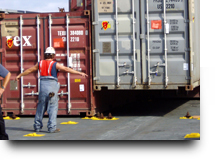 |
 Longshore Workers Tout Cooperation with Employers Longshore Workers Tout Cooperation with Employers
Stung by diminishing work and concerned about a further loss of cargo when the Panama Canal is enlarged in 2014, the International Longshore and Warehouse Union is embarking upon a new era of cooperation with others in the transportation industry.
The powerful West Coast longshore union is working with employers, ports and inland carriers to promote their coast as the logical gateway for U.S. trade with Asia. Changing the perception of cargo interests will not be easy, but the ILWU says it is committed to growth.
“We’re perceived as a militant union. I believe we are a progressive union,” Rich Dines, ILWU Local 13 board member, told Wesccon, the Western Cargo Conference of forwarders and customs brokers at their annual meeting in Rancho Mirage, Calif.
Dines insisted the union’s militant tag is overblown. The last ILWU strike was in 1971, he noted. The 2002 West Coast port shutdown was actually a lockout by employers, although their action was precipitated by dock worker slowdowns during contract negotiations.
But the ILWU is concerned about the loss of jobs during the global trade recession. The union also recognizes that cargo has been diverted to Prince Rupert in Canada and to East and Gulf Coast ports, and the union’s image outside of the West Coast contributed to the diversion.
ILWU man-hours this year are down about 20 percent. Looking ahead to 2014, the third set of locks at the Panama Canal will allow 8,000 container vessels that now call at West Coast ports to carry their cargo directly to the East Coast.
In recent months, ILWU officials have joined port and transportation interests in promoting expansion projects in Los Angeles and Long Beach. The union is telling no-growth advocates that expansion of marine terminals and intermodal connectors can be accomplished in an environmentally sound way and will bring jobs to the communities. “Our ports are a treasure from which we all benefit,” Dines said.
The ILWU also supports importers and exporters in lobbying the Southern California ports to drop plans for new container fees. “More fees mean less cargo,” Dines said.
The ILWU will also work with employers on further automation of marine terminals to improve productivity, just as it did in 1960 with the Mechanization and Modernization Agreement that brought containerization to the West Coast, Dines said.
“Automation is coming with redevelopment projects and new terminals. We understand that,” he said. Some dock worker positions may be eliminated, but if cargo volume doubles, the union will come out ahead, Dines said.
Source: The Journal of Commerce Online
|
 |


